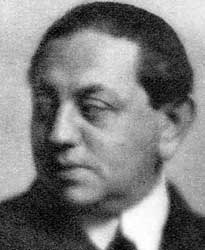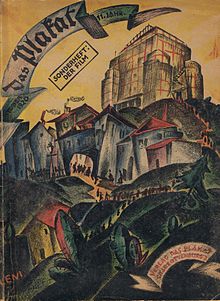fiction.wikisort.org - Director
Paul Leni (born Paul Josef Levi; 8 July 1885 – 2 September 1929) was a German filmmaker and a key figure in German Expressionism, making Hintertreppe (1921) and Waxworks (1924) in Germany, and The Cat and the Canary (1927), The Chinese Parrot (1927), The Man Who Laughs (1928), and The Last Warning (1928) in the United States.
This article needs additional citations for verification. (November 2009) |
Paul Leni | |
|---|---|
 | |
| Born | Paul Josef Levi 8 July 1885[1] |
| Died | 2 September 1929 (aged 44)[1] Los Angeles, California, U.S.[1] |
| Nationality | German |
| Occupation | Film director, art director |
| Years active | 1913–1929 |
| Notable work | |
| Movement | German Expressionism |
Life and career

Leni was born to a Jewish family[2] in Stuttgart. He became an avant-garde painter at the age of 15, he studied at Berlin's Academy of Fine Arts, and subsequently worked as a theatrical set designer, working for a number of theatres in Berlin (but not with Max Reinhardt).
In 1913, he started working in the German film industry designing film sets and/or costumes for directors such as Joe May, Ernst Lubitsch, Richard Oswald, and E. A. Dupont.
During World War I, Leni started directing as well with films such as Der Feldarzt (Das Tagebuch des Dr. Hart, 1917), Patience (1920), Die Verschwörung zu Genua (1920/21) and Backstairs (1921). Waxworks (1924) was planned as a four-part omnibus feature, but the last part was not shot when money ran out. He also made a series of unusual short animated films Rebus-Film Nr. 1–8, which were filmed crossword puzzles.
Leni designed short prologues for festive film premieres in Berlin cinemas, such as Lubitsch's Forbidden Paradise (1924), Herbert Brenon's Peter Pan (1924), and E. A. Dupont's Variety (1925).
In 1927, he accepted Carl Laemmle's invitation to become a director at Universal Studios and moved to Hollywood. There Leni made a distinguished directorial debut with The Cat and the Canary (1927), an adaptation of John Willard's stage play. The film had a great influence over Universal's later classic "haunted house" horror series, and was subsequently remade several times, notably in 1939 with Bob Hope. The following year he directed the big budget The Man Who Laughs (based on the novel by Victor Hugo), one of the most visually stylized of late period silent films.
His final film was The Last Warning, envisioned as a companion film for The Cat and the Canary due to its predecessor's popularity.[3] Leni died in Los Angeles on 2 September 1929, of sepsis brought on by an untreated tooth infection,[4] only eight months after its release.[5] He was 44.
Filmography
German films
As art director
- Ein Ausgestoßener (1913) (dir: Joe May)
- The Man in the Chot of AMSA ZUBAIR (1914) (dir: Joe May)
- The Armoured Vault (1914) (dir: Joe May)
- Der Katzensteg (1915) (dir: Max Mack)
- Der Blusenkönig (1917) (dir: Ernst Lubitsch)
- The Ring of Giuditta Foscari (1917)
- Veritas Vincit (1919) (dir: Joe May)
- Intoxication (1919) (dir: Ernst Lubitsch)
- The White Peacock (1920) (dir: E. A. Dupont)
- The Vulture Wally (1921) (dir: E. A. Dupont)
- Lady Hamilton (1921) (dir: Richard Oswald)
- Children of Darkness (1921)
- Frauenopfer (1921/22) (dir: Karl Grune)
- Tragedy of Love 1922) (4 parts, dir: Joe May)
- The Countess of Paris (1923)
- The Farmer from Texas (1925) (dir: Joe May)
- The Wife of Forty Years (1925) (dir: Richard Oswald)
- Dancing Mad (1925) (dir: Alexander Korda)
- Manon Lescaut (1926) (dir: Arthur Robison)
- Einspänner Nr. 13 / Fiaker Nr. 13 (1926) (dir: Michael Kertész)
- The Golden Butterfly (1926) (dir: Michael Kertész)
- Maytime (1926) (dir: Willi Wolff)
As director (and art director)
- 1917 Dr. Hart's Diary/ Der Feldarzt / Das Tagebuch des Dr. Hart
- 1917 Prima vera
- 1917 Dornröschen
- 1918 The Mystery of Bangalore
- 1919 The Platonic Marriage
- 1919 Prince Cuckoo
- 1920 Patience
- 1920/21 The Conspiracy in Genoa
- 1921 Hintertreppe (dir with Leopold Jessner)
- 1924 Waxworks (Das Wachsfigurenkabinett)
- 1925/26 Rebus-Film Nr. 1–8 (series of short films)
Universal Studio films
- The Cat and the Canary (1927)
- The Chinese Parrot (1927)
- The Man Who Laughs (1928)
- The Last Warning (1929)
References
- "BFI database: Paul Leni". bfi.org.uk. Retrieved 16 November 2016.
- Brook, Vincent (2009). Driven to Darkness: Jewish Emigre Directors and the Rise of Film Noir. Rutgers University Press. p. 256. ISBN 978-0813548333.
- Atkinson, Michael. "The Last Warning". silentfilm.org/. Archived from the original on 17 November 2016. Retrieved 16 November 2016.
The kind of party we’re in for was immediately familiar to audiences in 1929 because of the intense popularity two years earlier of Leni’s The Cat and the Canary—to which The Last Warning is devised to be a companion film, almost a redux.
- Landazuri, Margarita. "The Cat And The Canary". silentfilm.org/. Archived from the original on 18 December 2017. Retrieved 16 November 2016.
He died on September 2, 1929, of blood poisoning caused by a neglected tooth infection. He was 44 years old.
- Atkinson, Michael. "The Last Warning". silentfilm.org/. Archived from the original on 17 November 2016. Retrieved 16 November 2016.
was the final film for the illustrious Leni who died eight months after its release of blood poisoning at the age of forty-four.
External links
Paul Leni
На других языках
[de] Paul Leni
Paul Leni (geboren als Paul Josef Levi,[1] * 8. Juli 1885 in Stuttgart; † 2. September 1929 in Hollywood) war ein deutscher Grafiker, Bühnenbildner, Szenenbildner und Regisseur, der den Film der Weimarer Republik maßgeblich beeinflusste.- [en] Paul Leni
[es] Paul Leni
Paul Leni (nacido Paul Josef Levi) (Stuttgart, 8 de julio de 1885 – Los Ángeles, 2 de septiembre de 1929) fue un director de cine alemán, miembro destacado del cine expresionista alemán.[ru] Лени, Пауль
Пауль Лени (нем. Paul Leni; 8 июля 1885, Штутгарт — 2 сентября 1929, Лос-Анджелес) — немецкий художник-оформитель, художник-декоратор и режиссёр, оказавший значительное влияние на экспрессионизм в кино.Другой контент может иметь иную лицензию. Перед использованием материалов сайта WikiSort.org внимательно изучите правила лицензирования конкретных элементов наполнения сайта.
WikiSort.org - проект по пересортировке и дополнению контента Википедии